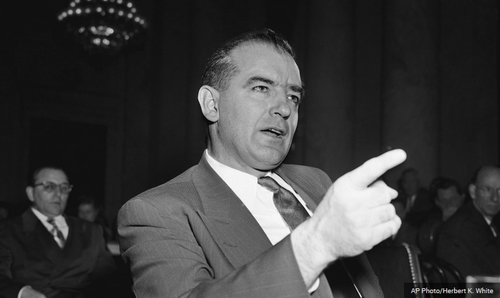
Authored by Charles Lipson via RealClear Politics (emphasis ours),
It is rare to meet someone with true moral courage, someone who risks everything to do what he knows is right. I was privileged to know such a man, George Anastaplo. His story, set during the Red Scare of the 1950s, needs to be told because it applies today, when political zealots again demand rigid conformity.
George, a boy from rural Illinois, refused to bow down to the most powerful lawyers in his home state. He knew their demands were wrong, even though he could have easily and truthfully said “yes” to their substance. He refused solely because he thought asking him violated basic guarantees in the U.S. Constitution.
The time was the early 1950s, and the demands came from ideological crusaders on the right, who insisted on anti-communist loyalty oaths. Today’s crusaders come from the left, demanding pledges of support for “Diversity, Equity, and Inclusion” (DEI). More on today’s ideological frenzy in a moment, but first, George’s story.
Born in downstate Illinois, the son of Greek immigrants, George’s most formative experience was serving in World War II, where he was a navigator on B-17 and B-29 bombers. In the service, he told me, he met soldiers with backgrounds and life experiences far different from anyone he had known growing up. For someone as bright and curious as George, that experience opened up a wider world.
After the war, George moved to the big city and went to the University of Chicago, where he earned his undergraduate and law degree (top of his class, 1951). He passed the bar exam and had only one more step before pursuing his chosen profession. Like all applicants, he had to answer a few questions from the Illinois State Bar Association.
The examination began with some standard questions about communism. Those should have been easy since George abhorred Marxism. Still, George’s answers, focused on civil liberties, were not what the bar association wanted to hear. First, he noted that dissent and even revolution were integral features of America’s constitutional history. Then, the hapless members asked George the big question: “Are you now or have you ever been … ?”
George Anastaplo refused to answer. He could have truthfully said, “No.” End of story. He could have noted that his parents’ homeland was fighting a brutal civil war to prevent communists from seizing control. He could have done all that, but he refused. His three-fold reply was that (1) the Constitution guaranteed freedom of association; (2) it was not illegal to belong to the Communist Party; and, most important, (3) it was totally improper for the Illinois Bar Association to ask him that question – or any question about an applicant’s political affiliation. His application to practice law was promptly denied.
So, George and the Illinois Bar Association then did what all good American attorneys do: they sued each other. The constitutional challenge, in which George represented himself, took a full decade to reach the Supreme Court. It was the only case George ever argued, and he lost it despite a powerful dissent from Justice Hugo Black.
“Too many men are being driven to become government-fearing and time-serving because the Government is being permitted to strike out at those who are fearless enough to think as they please and say what they think,” Justice Black wrote. “This trend must be halted if we are to keep faith with the Founders of our Nation and pass on to future generations of Americans the great heritage of freedom which they sacrificed so much to leave to us.”
George also received strong support from Leo Strauss, the great political philosopher and a seminal figure in conservative thought. He congratulated George for his “brave and just action” and added, “If the American Bench and Bar have any sense of shame, they must come on their knees to apologize to you." Of course, they never did.
George was never admitted to the bar. Instead, he taught political philosophy for six decades, wrote multiple books on political thought and civil liberties, eventually teaching at Loyola University’s law school. He was also our neighborhood Socrates, walking the streets of Hyde Park (near the University of Chicago) into his mid-80s, meeting friends and engaging in the kind of rigorous conversations recounted in Plato’s Dialogues.
Why does George Anastaplo’s moral courage matter for us today? Because we are enduring another age of ideological zealotry, coupled with demands to “sign or resign.” Or never be hired in the first place.
Today’s clearest analogy to anti-communist oaths are those demanding adherence to statements of “Diversity, Equity, and Inclusion.” The crucial point here is not the specific content of DEI statements. You might agree or disagree with them. The crucial point is that it is improper to make these demands for political conformity.
Such demands are, unfortunately, commonplace on university campuses. So are the bureaucracies that enforce them. Those demands and those bureaucracies are antithetical to the basic mission of a university, where freedom of expression and diversity of viewpoint should be core values, vigorously protected.
Instead, every university has its burgeoning DEI bureaucracy, which writes these statements, runs seminars to indoctrinate students, staff, and faculty, and punishes the recalcitrant. Many departments won’t even consider hiring someone who refuses to kneel in obedience.
Here, for example, is Berkeley’s “Rubric for Assessing Candidate Contributions to Diversity, Equity, Inclusion, and Belonging,” which it urges departmental search committees to use. (“Belonging” is a nice additional touch, isn’t it?) Note that voters in Deep Blue California strongly favor “merit” and have twice rejected any racial advantages in admissions. They are clearly opposed to what the university administrators are trying to impose here. No matter. Being a bureaucrat means never having to say you are sorry – or paying any attention to the desires of the taxpayers who pay your salary.
Another recent example comes from George Anastaplo’s home state, from one of the country’s great research institutions, the University of Illinois Urbana-Champaign. The top academic officer there, Provost Andreas Cangellaris, recently announced that the university “will soon require all faculty members to submit a diversity statement to be considered for tenure or promotion.” So, if you study quantum physics, organic chemistry, statistics, or artificial intelligence, you must pledge allegiance to an ideological statement far removed from your field of academic excellence. Until now, the university had been requiring DEI statements on a “voluntary basis.” Yeah, sure. Imagine refusing and trying to get hired?
I know what my friend George Anastaplo would do because he already did it. He would refuse to buckle to the DEI bureaucrats. He would fight the good fight all the way to the Supreme Court, if necessary, where today’s justices might listen more closely to Hugo Black’s powerful dissent:
The entire course of [George Anastaplo’s] life, as disclosed by the record, has been one of devotion and service to his country-first, in his willingness to defend its security at the risk of his own life in time of war and, later, in his willingness to defend its freedoms at the risk of his professional career in time of peace. The one and only time in which he has come into conflict with the Government is when he refused to answer the questions put to him by the Committee about his beliefs and associations. And I think the record clearly shows that conflict resulted, not from any fear on Anastaplo's part to divulge his own political activities, but from a sincere, and in my judgment correct, conviction that the preservation of this country's freedom depends upon adherence to our Bill of Rights.
We need a lot more people like George Anastaplo, and a lot fewer like Andreas Cangellaris and his heavy-handed cadre of DEI enforcers. We need a lot more people with George Anastaplo’s integrity in public and private universities, in K-12 schools, and in private businesses and nonprofits. His courage and his reverence for America’s Constitution are an enduring model.
Authored by Charles Lipson via RealClear Politics (emphasis ours),
It is rare to meet someone with true moral courage, someone who risks everything to do what he knows is right. I was privileged to know such a man, George Anastaplo. His story, set during the Red Scare of the 1950s, needs to be told because it applies today, when political zealots again demand rigid conformity.
George, a boy from rural Illinois, refused to bow down to the most powerful lawyers in his home state. He knew their demands were wrong, even though he could have easily and truthfully said “yes” to their substance. He refused solely because he thought asking him violated basic guarantees in the U.S. Constitution.
The time was the early 1950s, and the demands came from ideological crusaders on the right, who insisted on anti-communist loyalty oaths. Today’s crusaders come from the left, demanding pledges of support for “Diversity, Equity, and Inclusion” (DEI). More on today’s ideological frenzy in a moment, but first, George’s story.
Born in downstate Illinois, the son of Greek immigrants, George’s most formative experience was serving in World War II, where he was a navigator on B-17 and B-29 bombers. In the service, he told me, he met soldiers with backgrounds and life experiences far different from anyone he had known growing up. For someone as bright and curious as George, that experience opened up a wider world.
After the war, George moved to the big city and went to the University of Chicago, where he earned his undergraduate and law degree (top of his class, 1951). He passed the bar exam and had only one more step before pursuing his chosen profession. Like all applicants, he had to answer a few questions from the Illinois State Bar Association.
The examination began with some standard questions about communism. Those should have been easy since George abhorred Marxism. Still, George’s answers, focused on civil liberties, were not what the bar association wanted to hear. First, he noted that dissent and even revolution were integral features of America’s constitutional history. Then, the hapless members asked George the big question: “Are you now or have you ever been … ?”
George Anastaplo refused to answer. He could have truthfully said, “No.” End of story. He could have noted that his parents’ homeland was fighting a brutal civil war to prevent communists from seizing control. He could have done all that, but he refused. His three-fold reply was that (1) the Constitution guaranteed freedom of association; (2) it was not illegal to belong to the Communist Party; and, most important, (3) it was totally improper for the Illinois Bar Association to ask him that question – or any question about an applicant’s political affiliation. His application to practice law was promptly denied.
So, George and the Illinois Bar Association then did what all good American attorneys do: they sued each other. The constitutional challenge, in which George represented himself, took a full decade to reach the Supreme Court. It was the only case George ever argued, and he lost it despite a powerful dissent from Justice Hugo Black.
“Too many men are being driven to become government-fearing and time-serving because the Government is being permitted to strike out at those who are fearless enough to think as they please and say what they think,” Justice Black wrote. “This trend must be halted if we are to keep faith with the Founders of our Nation and pass on to future generations of Americans the great heritage of freedom which they sacrificed so much to leave to us.”
George also received strong support from Leo Strauss, the great political philosopher and a seminal figure in conservative thought. He congratulated George for his “brave and just action” and added, “If the American Bench and Bar have any sense of shame, they must come on their knees to apologize to you.” Of course, they never did.
George was never admitted to the bar. Instead, he taught political philosophy for six decades, wrote multiple books on political thought and civil liberties, eventually teaching at Loyola University’s law school. He was also our neighborhood Socrates, walking the streets of Hyde Park (near the University of Chicago) into his mid-80s, meeting friends and engaging in the kind of rigorous conversations recounted in Plato’s Dialogues.
Why does George Anastaplo’s moral courage matter for us today? Because we are enduring another age of ideological zealotry, coupled with demands to “sign or resign.” Or never be hired in the first place.
Today’s clearest analogy to anti-communist oaths are those demanding adherence to statements of “Diversity, Equity, and Inclusion.” The crucial point here is not the specific content of DEI statements. You might agree or disagree with them. The crucial point is that it is improper to make these demands for political conformity.
Such demands are, unfortunately, commonplace on university campuses. So are the bureaucracies that enforce them. Those demands and those bureaucracies are antithetical to the basic mission of a university, where freedom of expression and diversity of viewpoint should be core values, vigorously protected.
Instead, every university has its burgeoning DEI bureaucracy, which writes these statements, runs seminars to indoctrinate students, staff, and faculty, and punishes the recalcitrant. Many departments won’t even consider hiring someone who refuses to kneel in obedience.
Here, for example, is Berkeley’s “Rubric for Assessing Candidate Contributions to Diversity, Equity, Inclusion, and Belonging,” which it urges departmental search committees to use. (“Belonging” is a nice additional touch, isn’t it?) Note that voters in Deep Blue California strongly favor “merit” and have twice rejected any racial advantages in admissions. They are clearly opposed to what the university administrators are trying to impose here. No matter. Being a bureaucrat means never having to say you are sorry – or paying any attention to the desires of the taxpayers who pay your salary.
Another recent example comes from George Anastaplo’s home state, from one of the country’s great research institutions, the University of Illinois Urbana-Champaign. The top academic officer there, Provost Andreas Cangellaris, recently announced that the university “will soon require all faculty members to submit a diversity statement to be considered for tenure or promotion.” So, if you study quantum physics, organic chemistry, statistics, or artificial intelligence, you must pledge allegiance to an ideological statement far removed from your field of academic excellence. Until now, the university had been requiring DEI statements on a “voluntary basis.” Yeah, sure. Imagine refusing and trying to get hired?
I know what my friend George Anastaplo would do because he already did it. He would refuse to buckle to the DEI bureaucrats. He would fight the good fight all the way to the Supreme Court, if necessary, where today’s justices might listen more closely to Hugo Black’s powerful dissent:
The entire course of [George Anastaplo’s] life, as disclosed by the record, has been one of devotion and service to his country-first, in his willingness to defend its security at the risk of his own life in time of war and, later, in his willingness to defend its freedoms at the risk of his professional career in time of peace. The one and only time in which he has come into conflict with the Government is when he refused to answer the questions put to him by the Committee about his beliefs and associations. And I think the record clearly shows that conflict resulted, not from any fear on Anastaplo’s part to divulge his own political activities, but from a sincere, and in my judgment correct, conviction that the preservation of this country’s freedom depends upon adherence to our Bill of Rights.
We need a lot more people like George Anastaplo, and a lot fewer like Andreas Cangellaris and his heavy-handed cadre of DEI enforcers. We need a lot more people with George Anastaplo’s integrity in public and private universities, in K-12 schools, and in private businesses and nonprofits. His courage and his reverence for America’s Constitution are an enduring model.







